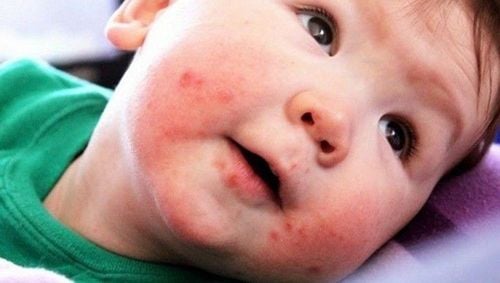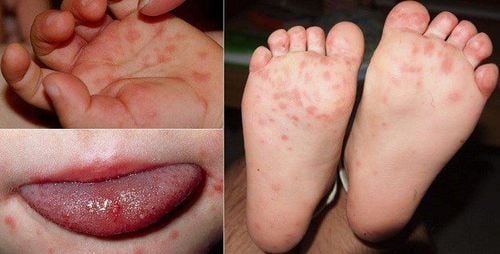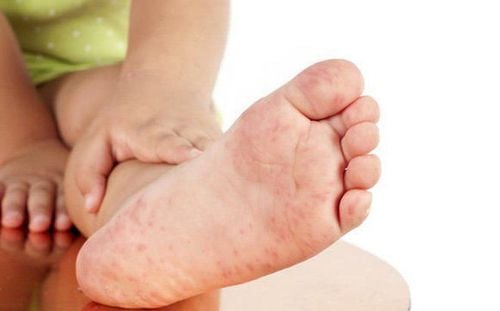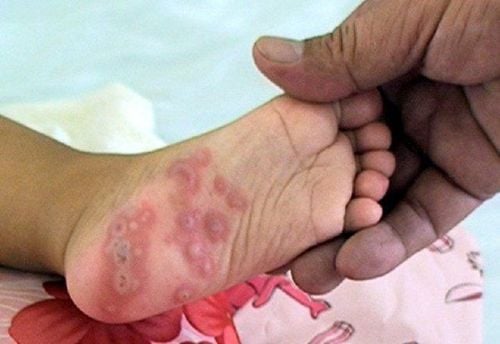This is an automatically translated article.
The article was professionally consulted by BSCKII Pham Thi Khuong - Pediatric Center, Vinmec Times City International Hospital.Hand, foot and mouth disease is an acute infectious disease that spreads from person to person by gastrointestinal tract and by direct contact with nasopharyngeal secretions, saliva, blister fluid or feces of an infected person and easily causes epidemics. .
1. What is hand, foot and mouth disease in children?
Hand, foot and mouth disease in children is an infectious disease caused by enteroviruses (with different types such as coxsackievirus, echovirus,... caused). A large proportion of hand, foot and mouth disease cases are caused by Coxsackievirus A16, which is self-limiting and has few complications. In addition, hand, foot and mouth disease caused by Enterovirus 71 (EV71) is considered dangerous because it is often accompanied by many other complications.
Hand, foot and mouth disease in young children caused by Coxsackievirus A16 is considered a mild disease. The patient will recover soon within 7-10 days without treatment. When EV71 is the causative agent of hand - foot - mouth disease, the disease will have the most serious complications and death. Neurological, cardiovascular and respiratory complications can threaten the health and life of children by causing meningitis and encephalitis. In Vietnam, according to experts from the Ministry of Health, this year, up to 21% of cases of hand, foot and mouth disease are caused by EV71. There have been many deaths from encephalitis resulting from hand, foot and mouth disease in children due to EV71.
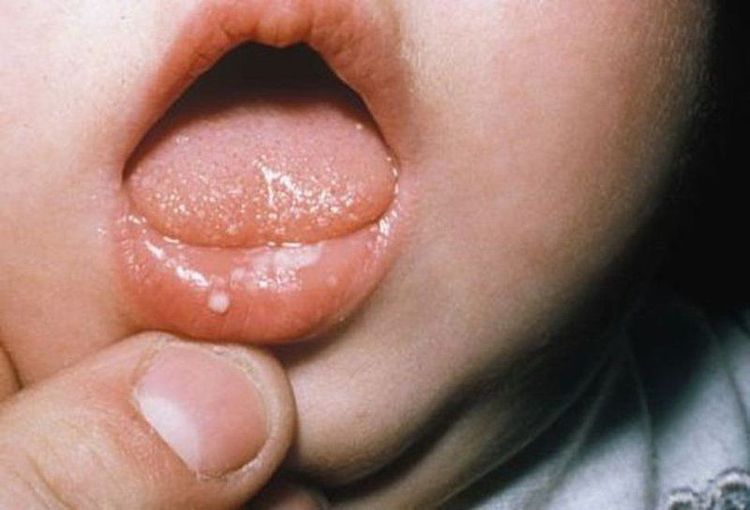
Có tới 21% trường hợp bệnh tay chân miệng do EV71 tại Việt Nam trong năm nay.
2. Developmental stages of hand, foot and mouth disease in children
There are 3 stages of development of hand, foot and mouth disease in young children that almost every case will have to go through:
Atypical form, or clinical stage when the child has signs of rash, mouth ulcers but not Obviously, the disease is difficult to diagnose. The acute form has four typical stages, lasting 3 to 10 days: Incubation period (3-7 days): The disease has no symptoms.
Onset phase (1-2 days): With symptoms such as low-grade fever, fatigue, sore throat, anorexia, diarrhea several times a day.
The full-blown disease stage lasts from 3 to 10 days: The child has mouth ulcers that develop to a diameter of 2-3 mm on the lining of the mouth, gums, and tongue. The rash spreads and leaves a bruise. Children with low-grade fever, vomiting and are at risk of neurological, cardiovascular and respiratory complications.
Children will recover on their own after 3 to 5 days if it is hand, foot and mouth disease in young children caused by coxsackievirus A16.
Fulminant form: The disease leads to circulatory failure, respiratory failure, coma, convulsions leading to death. This form of disease is usually caused by the EV71 virus.
3. How to treat hand, foot and mouth disease in children
For hand, foot and mouth disease in young children, first of all, it is necessary to limit the child's contact with others to avoid spreading the disease to other children. At home, parents need to pay attention to handling baby's waste, disinfecting, using gloves and masks to avoid infection with pathogens. In addition, items such as bowls, chopsticks, and spoons of the baby should also be kept clean by washing them to avoid spreading the disease to family members. Parents should take their children to the hospital for medical examination and testing as soon as possible to avoid complications by the care and hygiene of the mouth, throat, and skin of doctors and patients, even though there is no specific drug to treat. HFMD. During illness, children need to drink enough water. Common drugs used for children with hand, foot and mouth disease are Paracetamol (such as Efferalgan, Panadol, Tylenol) and Ibuprofen (such as Advil, Nurofen).
4. Hand, foot and mouth disease in children should abstain from what?
Regularly clean children's toys, items and places where children come into contact and play. Wash hands and feet before playing with children. Let children eat hygienically, avoid eating unhygienic and unknown foods. Thoroughly clean children's eating utensils and do not allow children to share napkins and handkerchiefs with others. Baby's waste must be disposed of in the right place, hygienically.
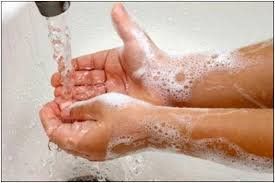
Vệ sinh tay chân trước khi chơi cùng trẻ.
Many parents think that when hand, foot and mouth disease leads to a rash, children need to abstain from the wind and contact with water. However, these two have no scientific basis. Make sure the environment is clean, avoid exposing your child to polluted air and dirty water so that the disease does not spread. Do not let your child scratch or poke the blisters on the skin. Do not use salt, lemon or any other skin-healing, anti-inflammatory medicine to reduce the rash without a doctor's prescription. The most important thing that parents need to remember is that when a child has any signs of suspected hand, foot and mouth disease, parents need to take the child to the hospital for testing and treatment advice. This is the fastest and safest way to ensure your child's health and avoid spreading this dangerous disease to family, loved ones and the community.
Pediatrics department at Vinmec International General Hospital is the address for receiving and examining diseases that infants and young children are susceptible to: viral fever, bacterial fever, otitis media, pneumonia in children, ... With modern equipment, sterile space, minimizing the impact as well as the risk of disease spread. Along with that is the dedication from the doctors with professional experience with pediatric patients, making the examination no longer a concern of the parents.
Please dial HOTLINE for more information or register for an appointment HERE. Download MyVinmec app to make appointments faster and to manage your bookings easily.




